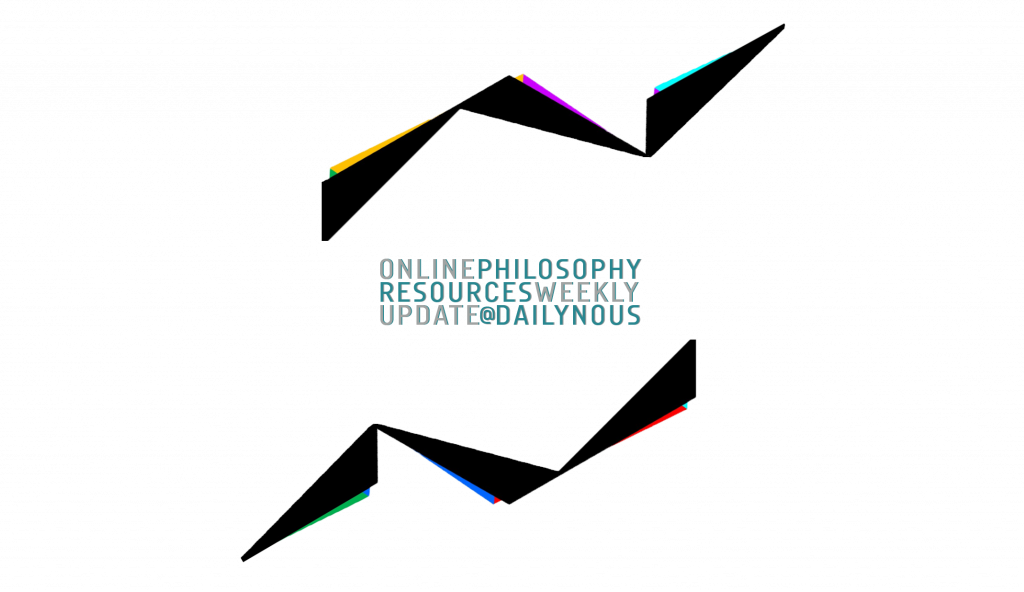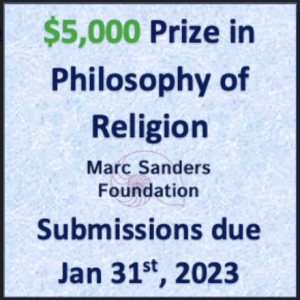Online Philosophy Resources Weekly Update
The weekly report on new and revised entries at online philosophy resources and new reviews of philosophy books…

New:
- Legal Rights by Ori Herstein.
- Ernst Bloch by Ivan Boldyrev.
- Fitting Attitude Theories of Value by Christopher Howard.
Revised:
- Ibn Bâjja [Avempace] by Josep Puig Montada.
- Dewey’s Moral Philosophy by Elizabeth Anderson.
- Bernard Williams by Sophie-Grace Chappell and Nicholas Smyth.
- Alfred Tarski by Mario Gómez-Torrente.
- Children’s Rights by David William Archard.
- Ibn Rushd’s Natural Philosophy by Josep Puig Montada.
- Négritude by Souleymane Bachir Diagne.
- Metaethics by Geoff Sayre-McCord.
- Coercion by Scott Anderson.
- Modal Logic by James Garson.
IEP ∅
NDPR ∅
Recent Philosophy Book Reviews in Non-Academic Media
- On Paradox: The Claims of Theory by Elizabeth Anker is reviewed by Michael W. Clune at Los Angeles Review of Books.
- How to Say No: An Ancient Guide to the Art of Cynicism by Diogenes and the Cynics, and M.D. Usher (ed., trans.), is reviewed by Costica Bradatan at The Times Literary Supplement.
- Justice for Animals: Our Collective Responsibility by Martha Nussbaum is reviewed by Sigal Samuel at Vox.
- Living for Pleasure: An Epicurean Guide to Life by Emily A. Austin is reviewed by Julian Baggini at The Guardian.
Open-Access Book Reviews in Academic Philosophy Journals*
- Open Future: Why Future Contingents are All False, by Patrick Todd is reviewed by Alessio Santelli in the European Journal of Analytic Philosophy.
* To have book reviews from your journal included in this section, see the instructions here.
Compiled by Michael Glawson
BONUS: Simone Weil takes an ethics course



Re: Elizabeth Anderson’s quite helpful revised entry on the moral philosophy of Dewey in conjunction with the other related entries
The SEP now has a nice collection of entries on the philosophy of John Dewey, however, there appears to be studied reluctance to describe his political philosophy in terms of democratic socialism. Consider therefore this short piece I wrote some years ago: “John Dewey’s Radical Liberalism & Democratic Socialism”
“The only form of enduring social organization that is now possible is one in which the new forces of productivity are cooperatively controlled and used in the interests of effective liberty and development of the individuals that constitute society. Such a social order cannot be established by an unplanned and external convergence of the actions of separate individuals, each of whom is bent on personal private advantage. This idea is the Achilles hill of early liberalism [no doubt owing to its indissoluble connection to ‘early’ capitalism].” — John Dewey (1935)
John Dewey was a “socialist,” a democratic socialist, the adjective important if only to distinguish his democratic socialism from authoritarian or (party-) “state” socialism. Thus defined, this conception and commitment was further refined by Dewey’s insistent reminder that such socialism was qualified as “democratic” not simply in reference to the way to socialism, that is, as proclaiming the path to socialism to be largely circumscribed by conventional electoral politics. More importantly, it was also meant to apply with full force to socialism “when you get it.” Robert Westbrook suggests that Dewey is “perhaps best described as a socialist democrat rather than a democratic socialist” owing to his belief in the “more inclusive end of ‘democracy as a way of life.’” But given the distorting and debilitating (and now more visibly ecologically and environmentally destructive) effects of capitalism on contemporary liberal democratic polities (and the larger world), it strikes me as more rhetorically transparent and politically powerful if we stick with Dewey’s self-description.
Dewey’s democratic socialism also invoked the centrality of a set of values and principles unique to Liberalism (capitalized so as not to be confused or conflated with the ‘liberalism’ of party politics, especially that of the Democratic Party, although there is some overlap in their connotations) “what he took to be the central tenets of liberalism.” As Westbrook informs us, Dewey’s critical examination of the Liberal tradition was guided by a belief in the necessity for its revitalization and reconstruction, a process that amounts to the proverbial separation of “the wheat from the chaff” in Liberalism, the chaff in this case being its historical genesis in, and ongoing association with, the “ideology of the bourgeoisie.” “The wheat … lay in three values central to [L]liberalism: liberty, individuality, and the freedom of inquiry, discussion, and expression,” which should be understood in the wider philosophical context of Dewey’s appreciation of the triune values of the French Revolution: liberté, égalité, fraternité, values for which Dewey sought, loosely, proper non-dogmatic metaphysical or principled warrant owing to their intrinsic significance to our most vital and appealing models of democratic life. So understood, democracy has teleological intimations and an utopian-like (in a non-pejorative sense) orientation insofar as it means
“ … the full realization of the possibilities of human society as such. It [is] not ‘an alternative to other principles of associate life. It is the idea of community life itself. It is an ideal in the only intelligible sense of an ideal: namely, the tendency and movement of something which exists carried to its final limit, viewed as completed, perfected.’ Since such perfection [is] impossible in a precarious, uncertain world, democracy is a regulative ideal, not a fact, yet it [is] an ideal rooted in the most essential features of human experience. ‘Whenever there is conjoint activity whose consequences are appreciated as good by all singular persons who take part in it, where the realization of the good is such as to effect and energetic desire and effort to sustain it in being just because is it a good shared by all, there is in so far a community. The clear consciousness of a communal life, in all its implications, constitutes the idea of democracy.’”
Liberal ideals, correctly construed, are thus themselves capable of vividly highlighting the gap between a radical Liberal democracy and the reality of capitalist society, for they accord metaphysical and moral legitimacy and urgency to the ongoing struggle to “realize democratic modes of life in their full meaning and far-reaching scope,” a struggled animated by the principles and praxis of a democratic socialism. Seen in this light, Dewey is in a tradition of Liberal democratic socialism that begins with J.S. Mill and is most recently represented by no less than John Rawls and Charles W. Mills.
For Dewey, revolutionary transformation need not be violent, and the “renascent” Liberalism that philosophically and politically sanctions such transformation is “radical” insofar as it perceives the “necessity of thoroughgoing changes in the set-up of institutions and corresponding activity to bring the changes to pass:” “For the gulf between what the actual situation makes possible and the actual state itself is so great that it cannot be bridged by piecemeal policies undertaken ad hoc. The process of producing the changes will be, in any case, a gradual one.”
See too: John Dewey’s Experiments in Democratic Socialism
This is better: https://plato.stanford.edu/entries/dewey-political/
Mangled sentence in the section on “Reconstructing Liberalism:” “Rather, liberalism it for modern societies, usually in a more socialist and radical direction.”